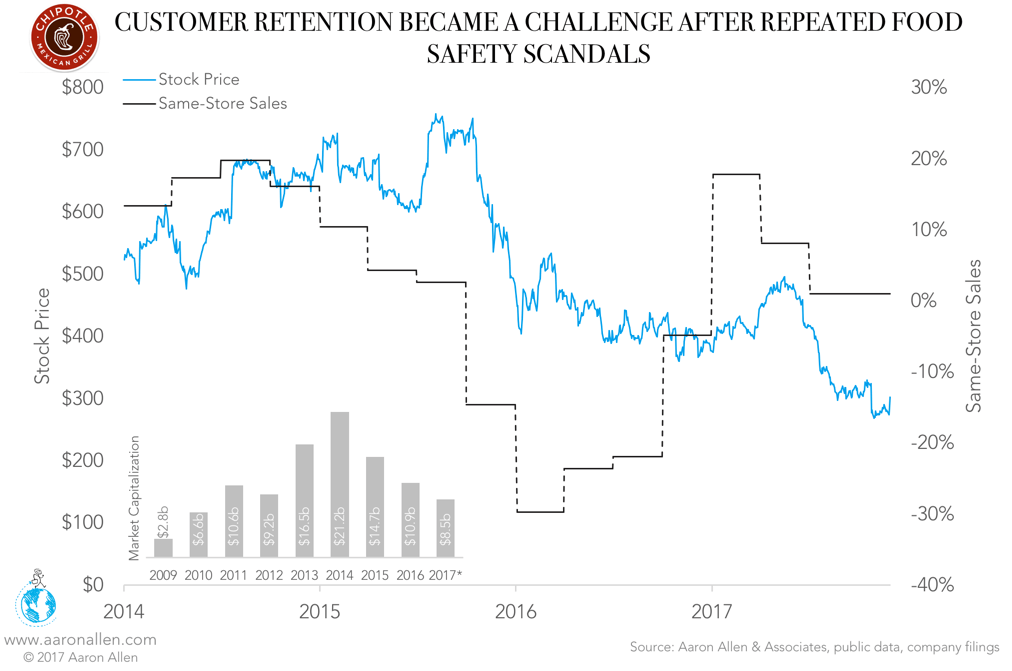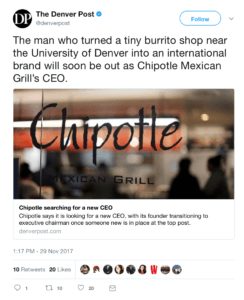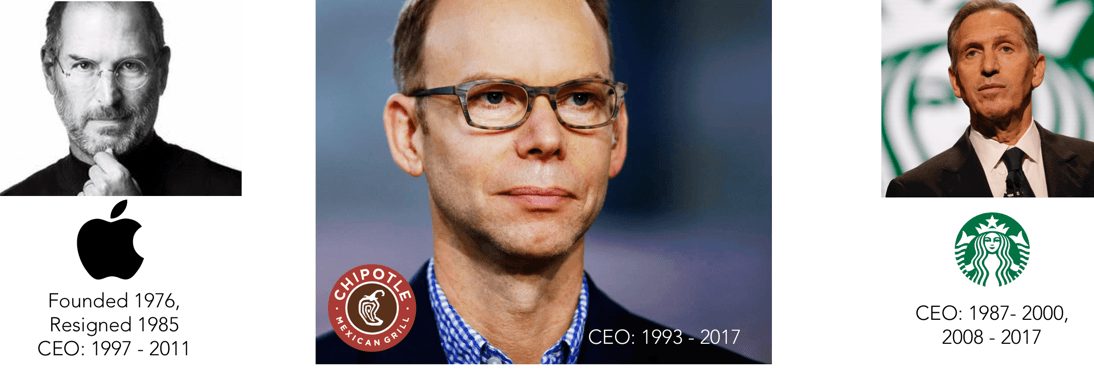The news that Chipotle CEO Steve Ells will be stepping down from the very company he founded was certainly a huge story for the foodservice industry – but it was one that got a bit lost in the shuffle of the many other headlines of the week. And it wasn’t too surprising — in fact, we anticipated that Ells would be out quite some time ago. (We also anticipated that co-CEO Moran would be out just three days before he left the chain.)
It was certainly a long time coming. Since its massive food safety scandals of 2015, Chipotle has fumbled and failed to recover — in terms of both crisis communications as well as restoring investor confidence. We’ve discussed before the possibility of corporate sabotage due to statistical anomalies and the fact that the chain failed on the very notion on which the company was founded: “Food with Integrity.” But that theory aside, it’s been a rough few years for Chipotle.
More on all of this below, but here’s the short of it:
- The leadership change is as much about crisis communications and addressing perception as much as it is a new CEO coming in
- Congratulations are in order for Steve Ells and activist investor Bill Ackman, as this effort is clearly indicative of many behind-the-scenes conversations that have been handled effectively and with maturity
- Just as Steve Jobs with Apple and Howard Schultz with Starbucks, Ells probably is the right man to be at the helm in the long term – but is not the man for the moment
- It will be interesting to see how much involvement Ells has going forward as he’s serving in the capacity of Chairman of the Board
- International expansion is the greatest area of opportunity for Chipotle (after they’ve shored up domestic operations and recover some of their previously dominant stock performance)
TAKING OVER FOR THE FOUNDER
Since going public in 2006 to the time of the 2015 scandals, Chipotle was defying the odds, reaching nearly $22 billion in market capitalization. Now they’re down to only $8.5 billion.

The bad news for the CEO who will ultimately take over for Ells is that Ells still plays a big role in the company. It brings to mind the founding and resignation of another Steve — Apple co-founder Jobs — who left Apple in 1985, seven years after he started the company, only to return twelve years later to the day. But unlike Jobs, Ells will still remain intimately involved in the company as Chairman of the Board and will therefore still set the strategy (in fact, the new CEO will likely report to Ells).

The way Steve Ells and Bill Ackman have decided to move the company forward serves as an example of how an activist investor can apply influence and resources in a very effective way; and also how a company and its board can respond to and accept that influence in a way that is the most positive for all involved (shareholders, stakeholders, and the interaction between activist and troubled CEO). Perhaps even more impressive is the way in which Bill Ackman and Steve Ells worked this out in private. There is a lot at play behind the scenes here – including the growth, maturity, and acceptance of a hard lesson with humility, as Steve Ells has finally conceded to accept with grace and dignity.
So who might the new CEO be? We have some ideas, and there’s certainly a short-list internally, but it remains unclear. One thing, though is for certain: The company is likely looking for someone with crisis experience (which might prove even more important than having restaurant experience).
But with the previous CEO still involved in the company — one who has a reputation for being authoritative and strong-willed — as Executive Chairman of the Board, it could remain challenging for a new CEO to turn the business around. It certainly begs the question: How much of this announcement is about public perception versus actually effectuating change within the organization?
FOLLOWING THE PATH OF SCHULTZ AND STARBUCKS?
This story also parallels that of Howard Schultz’s journey with Starbucks. He joined the company in 1982 and began to serve in the capacity of CEO starting in 1987. Schultz ran the company effectively for a 13-year stretch before leaving in 2000, and (similarly to Ells’ plan) served as Chairman of the Board and focused on international growth strategy.
Between 2000 and 2008 (with Schultz as Chief Global Strategist) Starbucks added 12,871 stores globally, with the percentage growth of the international footprint outpacing that of domestic expansion by 1.6x. The share of international stores went from 21% when Schultz started working in this new position, to 29% when he returned as CEO (36% increase). In this period, 2.2 domestic stores were opened for every international unit. In contrast, between 1992 – 2000, the ratio was 3.6 domestic stores for every international opening.
To us, this seems like a very logical pattern to follow. We’re not even affiliated with Chipotle, and get calls from all over the world expressing interest for the brand globally (after all, everybody has been looking for “the next Chipotle” for years). International expansion and brand translation is a major part of our practice, and many US-based foodservice brands have set their sights on expanding their world footprint.
It’s only logical this is part of Chipotle’s story. The next chapter will focus on the turnaround and shoring up US comp-store sales growth (which we’re sure will make for a compelling case study of how they achieve these targets and message the turnaround for the existing system). The chapter following is almost certainly – in our mind – international expansion, and we wouldn’t be surprised to be running into Ells in international airports sometime soon.
THE NEXT CHAPTER IS ALREADY UNDERWAY
Already, the announcement that Ells would step down is illustrative that Chipotle is getting stronger in terms of crisis communications. (The chain hired crisis PR firm Burson-Marsteller in 2016).

The fact that the Ells news came to light just as sexual harassment allegations against veteran Today show host Matt Lauer surfaced meant that it was watered-down a bit. There’s a significant difference between consumer media and business media, and what better time could there be to get this news (which was necessary, being a publicly traded company) out — as now the message can be massaged and managed in a more controlled manner. And, frankly, that was likely the Chipotle strategy: to put this news on ice, shelving it until something came along to elicit bigger headlines (like Matt Lauer getting fired).
This is exactly the type of strategy a seasoned communications pro would use, and the timing was expert. In an interesting twist, it was Lauer who landed the first big interview with Ells on Chipotle’s food safety issue and his public apology.

WHAT IS NEXT FOR STEVE ELLS?
If you’re Steve Ells, who would you want to be taking your place as CEO? Someone who really shows you up in terms of running the company (which would benefit you financially, but could end up with a bruised ego), or someone who may not be able to get the job done, leaving the opportunity to step back in and right the ship to prove you’re the (only) man for the job?
It’ll be interesting to see what Ells does professionally as he vacates the CEO position in his own company. Will he truly be “just” a board member at Chipotle, and allocate the rest of his time to other potential business ventures or philanthropic interests? Will he keep his office and parking spot? These are some questions that reports should, and probably will, be asking soon.
RETURNING AS THE SAVIOR
Our prediction: The new CEO will come in and make some changes (mostly for public perception), and eventually leave, allowing Ells to return to the company as savior (much in the same way that Jobs did with Apple, and Schultz with Starbucks). It’s a process that could take a few years, or it could happen much more quickly. The average life span for a publicly traded restaurant CEO these days is roughly 18 months and heads are rolling much faster than they have historically.
Expect to see the stock start to recover cautiously until the new CEO is announced, and continue on an increasing trajectory as the new leader announces plans and begins to get traction with implementing them
Overall, this was the right moves at the right time, and one that demonstrates maturity among management (as well as restraint and good judgment on behalf of the CEO). Chipotle still has the potential to set the world on fire and dominate again in the US, and to begin dominating in international markets (especially with the help of an expert equipped to handle the unique challenges that come with international growth).

